- Home
- Andrew McGregor
Bloody Stalingrad Page 10
Bloody Stalingrad Read online
Page 10
Hausser took a deep breath, sighing in part disbelief, turning to look at Hase, seeing the young man’s confusion. The young commander cleared his throat and sighed, his words in a slow dismissive tone, ‘Tatu…take the six outside to the lake.’
Tatu moved forward, indicting to the six men with his submachine gun, ‘Get up you scum, we are going out.’ His face grim with determination, ‘Take your uniforms off.’
Hausser spun round. ‘Wh…what?’
The Romanian quartermaster looked across at him, ‘We will need them to get through the Russian lines…and they don’t need them anymore.’ He glared at Hausser, his determination clear.
Hausser considered briefly then slowly nodded, his face grim. ‘Do it.’
The selected Russians slowly rose from their positions, their demeanour defiant but resigned, the submachine guns pointing at them overriding their urge to attack their captors. Hesitantly, one by one they removed their tunics and trousers, revealing their felt body length underwear. One by one they followed Tatu’s indication, slowly shuffling towards the door to the lake, aware he was covering them with his weapon.
Petru rose from his position, picked up his rifle and joined Tatu, his weapon pointing at waist height towards the prisoners. His face filled with hatred, he indicated for the first Russian to open the door.
As the six prisoners slowly filed out of the hall onto the lakeside, Hausser turned to face Hase, stretching his hand out to indicate for his comrade to remain calm, the commander seeing that the man was struggling to comprehend what was happening.
The door closed behind Petru as the men walked out towards the pier, the older bearded Russian turning briefly and solemnly to observe the soldiers inside. As they walked slowly, their heads dropped, the realisation there was nowhere to run, their fate sealed. The men felt the intense cold bite at their bodies, the frost beneath their feet sucking at their body heat.
Back inside, Udet stepped forward to cover the remaining prisoners, noticing they were all looking at the floor, avoiding any eye contact, each individual captive struggling with his personal thoughts.
Hausser’s gaze slowly moved from his comrade to the group, then twisted back surprised as he heard Hase cough, take a sharp intake of breath then begin to speak. He slowly shook his head looking despondently at the young commander, his voice trembling, disbelief and tears in his eyes, ‘What are we doing here?’
The burst of submachine gun fire outside broke the silence, the men in the room instinctively ‘jumping’ at the abrupt noise and the dark meaning it conveyed.
A stillness descended on the room as they all slowly and purposefully turned to look at the lone soldier that had just spoken, Hase standing with head bowed next to the main entrance.
Hase noticed their wide eyes and the surprise on their facial expressions, some stared at him with open mouths. The prisoners shifting in their positions all looking at him, with Udet and Hausser responding by tightening their grips nervously on their weapons, taking a step forward menacingly, their stance indicating for the prisoners to become calmer.
The young Russian sentry was wide eyed, his bloodied mouth open. He slowly raised his hand, pointing towards Hase, the soldier standing in German uniform next to the main doorway.
The young Russian shook his head in disbelief, stuttering briefly, the remaining prisoners’ gaze all following his outstretched hand, their faces stunned, voices silent. The sentry’s incriminating finger pointed straight at Hase’s face. ‘Y-you…You are Russian!’
Chapter Nine: Der Hilfswillinger
Some distance to the north of the lodge, the Russian captain sat relaxed in the small personnel carrier, his left boot resting on the front metal cupola of the tracked vehicle. He watched as one of his men unloaded a box of supplies from the other carrier and trudged with the heavy wooden container towards the artillery emplacement through the deep snow. Observing the gunners delicately move shells from a covered emplacement, he smiled comfortably to himself. The emplacement had been dug the day before and the heavy guns pushed into their new home earlier that morning. A clearing made in a small wood to provide extra cover should German planes take to the sky in search of ground targets.
The heavy artillery pieces faced north and were soon to commence firing into the lower suburbs of Stalingrad. His smile portrayed his thoughts that the Germans were now on the ‘back foot’ with the Russian army sweeping round their flanks. The morning briefing had indicated that resistance to the offensive after initial fighting had seemed weak, with the two prongs of the attack now heading towards Kalach in the German rear.
He looked down at the box of cigarettes in his lap, nestling in the curves of his thick overcoat. The red circle and strange writing on the packet indicating a definite improvement on the cigarettes he had received from army stores in war to date. The American branded tobacco was apparently ‘Lucky’ and he considered this complimented the British vehicle he was currently relaxing in. He contemplated these cigarettes were indeed lucky for him, the war supplies from America supplemented by considerable quantities of food for the Red Army. The British, keen to demonstrate their own support, providing him with a vehicle where horses would have previously been normality. He was also grateful for some personal comfort through the bitterness of war in the form of enhanced rations. Taking a cigarette from the packet, he lit it and closed his eyes as the warm smoke drifted into his lungs, enhancing his body’s battle against the elements.
‘We are nearly finished here, sir…where to next?’ He was startled from his thoughts as the carrier’s driver climbed over the right side of the vehicle and turned to speak to him.
‘Oh, erm…we go to the fishing lodge. Further south past Dubovyy Ovrag, we drop more supplies there.’ He retorted, irritated the man had distracted his line of thought. He grasped the collar of his overcoat, pulling it closer around his neck as a brief breeze swept over them, slowly drifting in from the frozen lake to their east and turned back to the driver, ‘Let’s go when they start up.’
The man nodded, his bushy moustache and furtive eyes just visible under his felt and fur cap, the exposure from driving permitting him additional clothing for warmth. ‘We will head there shortly then sir; the men are just dropping the last cases off for the artillerymen now.’
The officer nodded, taking another draw on his American cigarette and drifting into his thoughts once more, thinking back to the conversation he had had at the end of the morning’s briefing. He had approached the commissar and asked for a personal word, the situation he was presented with requiring further guidance. He explained to the young political officer his concerns regarding one of the soldiers he had met, the suspicion of butchery of enemy wounded and killing of prisoners. His concerns that this soldier was, in fact, torturing enemy soldiers.
The young political officer had seemed concerned at first, then his interest had seemed to wander, advising the captain that he was spending too much time thinking of one man when there was an ongoing conflict affecting the entire southern flank of the front.
The captain had argued that this would affect other men’s confidence and a unit’s efficient function if this went unchecked, that he would not allow this from one of the men under his command.
The political officer had considered this briefly, then stated that the ‘party’ could not condone such actions by individual troops, but that the man was killing the enemy after all. Dismissing the officer, he had simply advised, ‘If you don’t like it, ask him to stop or take him for a walk…we are not wasting time on such a thing.’
The officer had not needed an explanation of what ‘taking for a walk’ had meant, but had been irritated by the lack of direction he had received, the lack of responsibility taken for the problem. It was therefore up to him what to do, and as yet he was undecided.
He was distracted as one of his soldiers mounted the personnel carrier and sat alongside him, their bodies separated by the central storage containers on the vehicle. ‘That’s all
the supplies offloaded, sir.’ The man reported, moving his submachine gun across his lap. The young soldier then pulled the ear flaps of his cap down and began attaching them under his chin, wary of the cold that would soon surround them as the vehicles progressed.
The captain looked round, surveying the surroundings. The emplacement was now busy with artillerymen moving shells across from their storage bunker. As he watched, a gunner on the first artillery piece placed a shell into the breach and closed it with a dull metallic thud that resonated across the landscape. The officer in charge of the emplacement glanced across at him, gesturing a brief wave, then holding his arm in the air as he turned to face the on looking artillerymen, their faces fresh with anticipation.
The artillery sergeant nodded to his men, searching their faces for readiness. He received expectant and understanding nods in return, with this he was satisfied. Stepping slightly forward in the snow his hand dropped swiftly, his shout energising his men, ‘Fire!’
In reaction, the gunner pulled the firing cord and the artillery piece shuddered backwards, the roar of the gun breaking the calmness of the snow covered landscape scene around them. The gunners, all with their hands over their ears, watched as a plume of smoke rose from the gun barrel into the crisp air. The thunderous sound wave enveloping them as they stood, a hoarse cheer from the emplacement gunners following the gun’s bark. The 152mm shell flew across the landscape, its journey taking seconds before landing in the lower housing district of Stalingrad.
The captain leant forward, tapping the driver’s shoulder with his left hand. The engine of the tracked vehicle roaring into life, the carrier jumping forward slightly in the rough terrain. The tracks threw up churned snow in its wake as the small vehicle with its three passengers began to negotiate the slope away from the guns. Joining it, the second vehicle laden with supplies jolted after it, the tracks slipping in the frozen terrain until gaining the tracked grooves in the snow from the preceding vehicle. Both vehicles being carefully coordinated to avoid stumps and the roots of the trees as they exited the copse.
Behind them, the second artillery piece fired, then the third, the plumes of smoke rising from the guns as they propelled shells into the lower parts of the distant city. The smell of cordite swept across the artillery placement as the gunners feverishly reloaded their weapons.
The two small personnel carriers continued their journey southwards, joining the rough track now completely obscured by a blanket of frozen snow, their departure signalled by the deep thumps as the guns fired behind them again.
The small vehicles negotiated the makeshift exit from the copse and turned east, descending the gradual slope leading to the main north/south thoroughfare. Joining the main road, they turned to the south, heading towards the village in the distance.
The captain leant back again in the carrier, a rolled up spare overcoat behind him to add extra comfort. He lit another American cigarette, dropping his head back as he did so to look at the bleak grey cloudless sky. He drew deeply on the cigarette and blew smoke into the air, relishing the taste of the American brand in comparison to the rough Russian tobacco he had experienced before. Either side of the track lay iced bodies, contorted in frozen death, evidence of another failed attempt from enemy survivors to escape the Russian army’s advance.
The personnel carriers continued for nearly two hours in the snow, occasionally having to stop as one vehicle or the other struggled in the unforgiving terrain. The scenes of scattered bodies and discarded equipment lay all around the wide track as many of the enemy had considered this the road north to use in desperate attempts to escape their attackers. Some had been units determined to resist the attacks from the east, but these acts of bravery had been overcome by determined Russian tank attacks knowing their foe had little anti-tank equipment.
Having exited the village, they proceeded to a crossroads and turned to the east onto a rougher track leading down to the banks of Lake Sarpa. The journey was unforgiving with the track rutted and barely used by vehicles due to the remote destination at the lakes edge. The journey took over an hour as the men struggled to free their vehicles numerous times when the carriers occasionally failed to overcome snow drifts or the frozen rutted ground beneath.
At one point, they had had to slow to negotiate a destroyed lorry, stopping briefly to loot any remaining abandoned supplies from the back of the disabled vehicle. The frozen corpses of the Romanian forward command unit strewn around their destroyed transport, the vehicle and bodies having been overcome by carefully concealed machine guns. The ambushers understanding fully that this would be one of the main escape routes the enemy would take.
It was mid-afternoon when the small two vehicle convoy began to approach the banks of the lake, the light across the Russian Steppe now beginning to fade. The rutted track descended a steep decline to the frozen water’s edge as the drivers reduced their speed and lowered the gears on the personnel carriers to ensure they did not lose control, the danger of skidding on such an incline a risk to their precious cargo.
As the captain looked over the frozen lake to his left, he noted to himself that they would inevitably now have to spend the night at the fishing lodge. In the dimming light, he realised his eagerness to avoid exposing his unit to the bleak and bitter night time temperatures on a return journey through the snow was a high determining factor in this decision.
As the first personnel carrier ground over a small rise, the track split to the north and south before the lake’s edge. The carriers turned south and began to descend the gradual slope down to the Fishing buildings which now came into view, a low cold mist clinging to their structures. The captain sat up, smiling to himself as he noted a soldier walk out from the lodge to stand between the buildings and meet them. He considered he would scold the sentry for staying in the buildings, but decided to relent when he felt the freezing air of the lower depression envelope the small convoy as it proceeded towards the buildings.
There was smoke rising from the chimney of the main building and as his vehicle approached, the captain just being able to smell the faint aroma of food being cooked in the large hall. His stomach welcoming the thought of a freshly cooked meal and perhaps adding some American tinned meat to the supper taken from his supplies.
The first vehicle pulled into the small yard in front of the lodge and stopped with a brief jolt to the side of the sentry. The captain noted the soldier had some thick layers of clothing to protect him from the cold and nodded as the man stood to attention next to the vehicle, his rifle by his side, saluting him formally.
Saluting back, the captain rose from his seat and stepped over the side of the carrier, turning to face the sentry, greeting him with a warm, ‘Hello…at ease soldier.’
The sentry stiffened slightly, ‘Welcome to the lodge, sir.’ He retorted, eyeing the captain’s red epaulettes respectfully.
‘From Kiev?’ The captain stated recognising a slight accent.
‘Yes sir.’ The sentry replied, his eyes never leaving the captain’s.
‘Good.’ The captain replied, ‘Did not realise we had many from Kiev on this front now.’ He looked into the blue eyes of the sentry, his unshaven, but quite direct features interesting him. The man was perhaps mid-twenties and was obviously quite tired from the darkened lines under his eyes, ‘Which unit are you from?’
‘47th Army initially Sir…but now this unit, I fell asleep on guard duty sir.’ The sentry retorted.
The captain’s eyes narrowed, his mind quizzical, ‘You are a long way from home and your unit…how did you end up here?’ He watched as the sentry shifted on his feet, seeming uncomfortable at the scrutiny.
‘I was wounded in the Crimea, sir, shipped across the Kerch Straits and ended up here.’ The young sentry returned the captain’s stare as if to reassure him.
‘Well, you may not be in this unit long if you perform well.’ The captain replied, his demeanour softening at the sentry’s certainty and seeming determination. The officer knew full
well that most penal soldiers were desperate to return to ordinary units…avoiding the considerable extra dangers of the penal squads they had been assigned to due to mistakes.
The captain continued, his thoughts drifting, ‘Tell me, do you have a soldier here with a grey beard…maybe mid-forties?’
The sentry seemed to consider his question and then replied slowly, ‘Yes sir…I think he is out near the lake.’
The soldier’s eyes seemed saddened by the question and the captain wondered if the young man could comprehend what behaviour the older soldier was capable of, ‘I will need to speak with him later…anyway, for now, let us unload the supplies assigned to you. I will need a full report of the last day’s events from your commander.’
The sentry nodded, seeming more comfortable, ‘Yes sir, he is in the main hall awaiting you.’
The captain smiled, ‘We will stay the night here…have you plenty to eat?’
A brief flicker of a smile crossed the sentry’s face, ‘Yes sir, any other rations will be welcome though, we have only Romanian food left now.’ The sentry seemed to then think of something as his eyes widened, ‘However, we do have some Romanian brandy too sir…perhaps you will enjoy this with us?’
‘Ah, I see!’ The captain was warming to the younger soldier, a smirk forming on his face, ‘Perhaps the food is not restaurant quality…but we have some American supplies to supplement the cooking.’ The captain placed his left hand on the soldier’s shoulder, ‘I would be happy to join you in a drink, come…show us inside into the warmth.’
‘Yes sir.’ The sentry replied, ‘Please follow me.’ With this, the younger man turned on his heels and walked back towards the main doors of the building, hesitating at the entrance to await the captain, he dropped his rifle from his shoulder and held it in his left hand indicating with his right for the captain to proceed inside.

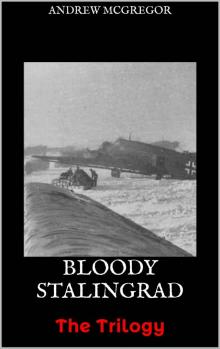 Bloody Stalingrad
Bloody Stalingrad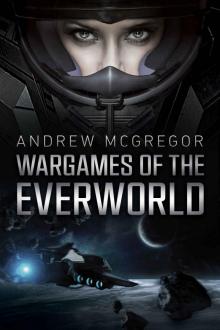 Wargames of the Everworld
Wargames of the Everworld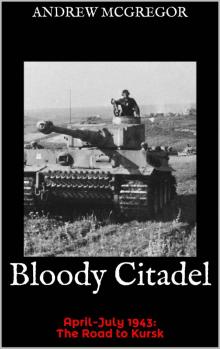 Bloody Citadel
Bloody Citadel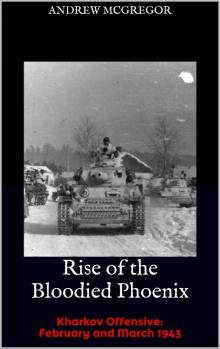 Rise of the Bloodied Phoenix
Rise of the Bloodied Phoenix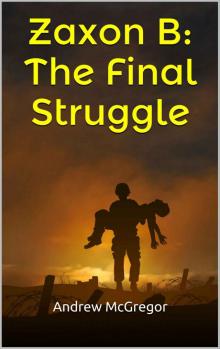 Zaxon B: The Final Struggle (Galaxies Collide Book 4)
Zaxon B: The Final Struggle (Galaxies Collide Book 4)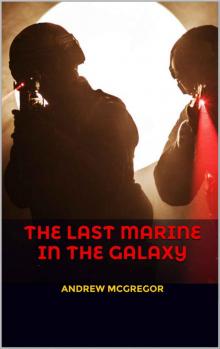 The Last Marine in the Galaxy (Galaxies Collide Book 1)
The Last Marine in the Galaxy (Galaxies Collide Book 1)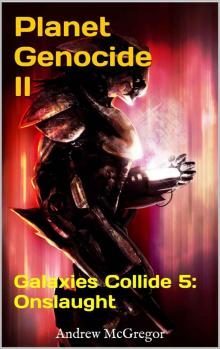 Planet Genocide II: Galaxies Collide 5: Onslaught
Planet Genocide II: Galaxies Collide 5: Onslaught